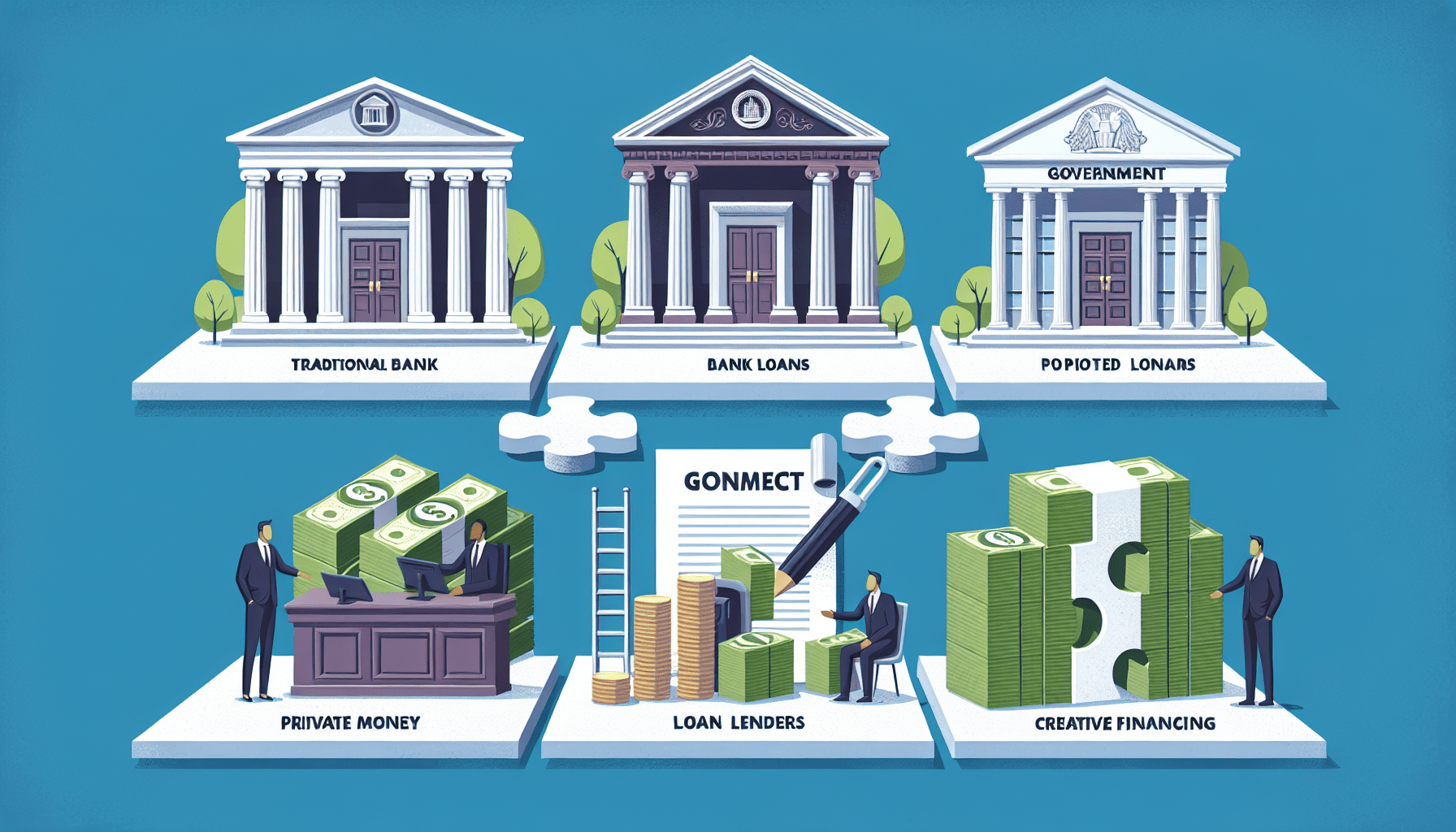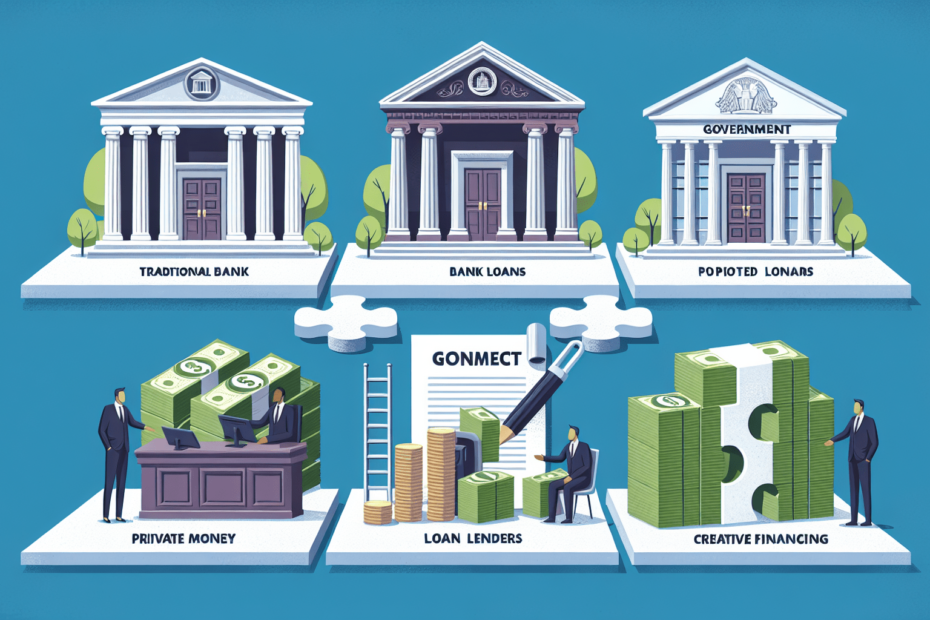Are you considering buying a rental property but unsure of your financing options? Look no further! In this article, we will explore the various financing options available to you when purchasing a rental property. Whether you are a first-time buyer or a seasoned investor, understanding the different ways to finance your investment can make all the difference in achieving your goals. So, let’s dive in and explore the world of rental property financing together!

Traditional Mortgage
Conventional Mortgage
A conventional mortgage is a traditional type of home loan that is not guaranteed or insured by a government agency. This type of mortgage is offered by private lenders such as banks, credit unions, and mortgage companies. To qualify for a conventional mortgage, you typically need to have a good credit score, a stable income, and a down payment of at least 20% of the purchase price. Conventional mortgages often offer competitive interest rates and flexible terms, making them a popular choice for many homebuyers.
FHA Loan
An FHA loan is a mortgage that is insured by the Federal Housing Administration (FHA). This type of loan is designed to make homeownership more affordable for low-to-moderate income borrowers. FHA loans are available through approved lenders and require a lower down payment compared to conventional mortgages, typically around 3.5% of the purchase price. Additionally, FHA loans have more flexible qualification criteria, allowing borrowers with lower credit scores to still be eligible. However, FHA loans do require mortgage insurance premiums, which increase the overall cost of the loan.
VA Loan
A VA loan is a mortgage that is guaranteed by the U.S. Department of Veterans Affairs (VA) and is available to eligible veterans, active-duty service members, and surviving spouses. VA loans offer several advantages, including no requirement for a down payment or private mortgage insurance. These loans also typically have competitive interest rates and more lenient qualification criteria. VA loans can be a great option for those who have served in the military and are looking to purchase a rental property.
USDA Loan
A USDA loan is a mortgage that is guaranteed by the U.S. Department of Agriculture (USDA) and is available to low-to-moderate income borrowers in rural areas. This type of loan offers 100% financing, meaning no down payment is required. USDA loans have flexible credit requirements and competitive interest rates. However, they are limited to designated rural areas and have income restrictions. USDA loans can be a viable financing option for those looking to invest in rental properties in eligible rural areas.
Cash Purchase
Personal Savings
Using personal savings to purchase a rental property is the most straightforward and simplest financing option. By using your own funds, you can avoid the need for a mortgage or loan. This option allows you to have full ownership of the property without any debt or interest payments. However, it requires having enough savings to cover the entire purchase price, which may not be feasible for everyone.
Home Equity Line of Credit (HELOC)
If you already own a property with substantial equity, you can consider obtaining a home equity line of credit (HELOC) to finance the purchase of a rental property. A HELOC is a revolving line of credit that allows you to borrow against the equity in your home. The interest rates for HELOCs are typically lower than other types of loans, and you only pay interest on the amount you borrow. However, using a HELOC for investment purposes can be risky, as it puts your primary residence at stake if you fail to make the payments on the HELOC.
Seller Financing
Seller financing, also known as owner financing, occurs when the seller of the property provides financing to the buyer instead of a traditional mortgage lender. In this arrangement, the buyer makes monthly payments to the seller, who acts as the lender. Seller financing can be beneficial for both parties, as it allows the buyer to avoid the strict qualification criteria of traditional lenders and provides the seller with a potential source of income. However, this financing option is not widely available and typically requires negotiation between the buyer and seller.
Hard Money Loan
Definition of Hard Money Loan
A hard money loan is a short-term, high-interest loan that is secured by the value of the property being purchased. These loans are typically provided by private investors or companies instead of traditional banks or mortgage lenders. Hard money loans are commonly used by real estate investors who need quick access to financing or who may not qualify for a conventional mortgage due to poor credit or unconventional property types.
Advantages of Hard Money Loans
One of the main advantages of hard money loans is their quick approval process. Unlike traditional mortgages, which can take weeks or even months to process, hard money loans can be approved and funded within a matter of days. Hard money lenders are mainly concerned with the value of the property being used as collateral, making the borrower’s credit history and income less important. Additionally, hard money loans provide flexibility in terms of property types and can be used for both residential and commercial real estate investments.
Disadvantages of Hard Money Loans
The primary disadvantage of hard money loans is the high interest rates and fees associated with them. Hard money lenders take on higher risk by providing financing without strict qualification standards, so they charge higher interest rates to compensate for this risk. These higher costs can significantly increase the overall cost of the loan and impact the profitability of the investment. Additionally, hard money loans are intended to be short-term solutions, usually lasting from a few months to a few years. Borrowers need to have a clear plan to repay the loan within the agreed-upon timeframe.
Private Money Loan
Definition of Private Money Loan
A private money loan, also known as a private lender loan, is a financing option provided by individuals or non-institutional entities. Private money loans are commonly used in real estate investing, where investors borrow funds from private individuals or organizations to finance their property purchases. Unlike hard money loans, private money loans do not necessarily have high interest rates and fees, as the terms can be more flexible and negotiated between the borrower and the lender.
Advantages of Private Money Loans
One of the main advantages of private money loans is the potential for more flexible terms compared to traditional mortgages or hard money loans. Borrowers and lenders can negotiate loan amounts, interest rates, repayment terms, and other conditions based on mutual agreement. Private money loans may also offer faster approval and funding, similar to hard money loans, making them suitable for time-sensitive investment opportunities.
Disadvantages of Private Money Loans
The main disadvantage of private money loans is the potential difficulty in finding private lenders. Unlike banks or mortgage lenders, private lenders are not as widely accessible or advertised. Building relationships with private lenders may require networking or seeking referrals from other real estate investors or professionals. Additionally, private money loans may still carry higher interest rates compared to conventional mortgages, especially if the borrower’s credit or financial history is less favorable.

Partnering with Investors
Finding Real Estate Investors
Finding real estate investors to partner with can be a beneficial financing strategy for purchasing a rental property. Real estate investment clubs, networking events, and online platforms dedicated to real estate investing are some avenues to connect with potential investors. It is essential to research and vet potential partners to ensure they have the necessary expertise, financial stability, and alignment with your investment goals.
Pros and Cons of Partnering with Investors
Partnering with investors can provide access to additional funds and expertise, allowing you to invest in more substantial properties or multiple properties simultaneously. It can also help mitigate the financial burden and risks associated with owning and managing a rental property. However, partnering with investors means sharing ownership and profits, as well as potentially compromising on certain decisions or having less control. Careful consideration of the terms and expectations is crucial when entering into a partnership.
Commercial Loan
Definition of Commercial Loan
A commercial loan is a mortgage specifically designed for commercial properties, such as office buildings, retail spaces, or industrial properties. These loans are intended for business ventures rather than personal use. Commercial loans are typically offered by banks, credit unions, and private lenders, and they have different qualification criteria and terms compared to residential mortgages.
Types of Commercial Loans
There are various types of commercial loans available, including traditional commercial mortgages, SBA 504 loans, and bridge loans. Traditional commercial mortgages are similar to residential mortgages and require a down payment, good credit, and a stable income. SBA 504 loans are guaranteed by the Small Business Administration and often offer favorable terms for small businesses. Bridge loans are short-term loans that help bridge the gap between the purchase of a new property and the sale of an existing one.
Eligibility for Commercial Loans
Qualifying for a commercial loan typically involves meeting specific criteria, such as having a solid business plan, demonstrating strong financials, and providing collateral. Lenders will assess factors such as the property’s potential income, the borrower’s creditworthiness, and the overall feasibility of the investment. It is important to prepare comprehensive financial documents and have a clear understanding of the property’s potential revenue and expenses before applying for a commercial loan.

Home Equity Loan
Definition of Home Equity Loan
A home equity loan, also known as a second mortgage, is a loan that allows homeowners to borrow against the equity they have built up in their property. The equity is the difference between the home’s market value and the remaining balance on the primary mortgage. Home equity loans are secured by the property and typically have fixed interest rates and repayment periods.
Pros and Cons of Home Equity Loans
Home equity loans can be a viable financing option for rental property purchases, as they enable homeowners to access funds without selling their property. The interest rates for home equity loans are often lower than other types of loans, making them a cost-effective choice. Additionally, the interest paid on a home equity loan may be tax-deductible, providing potential tax benefits. However, taking out a home equity loan means increasing the debt associated with the primary residence and putting it at risk if payments are not made. It is crucial to carefully assess the financial implications and ensure that the rental property investment is profitable enough to cover the loan payments.
1031 Exchange
Understanding 1031 Exchange
A 1031 exchange, also known as a like-kind exchange, is a tax-deferred strategy that allows real estate investors to sell a property and reinvest the proceeds into a similar or “like-kind” property, deferring the immediate payment of capital gains taxes. To qualify for a 1031 exchange, the properties involved must be held for investment or business purposes, and there are specific rules and timeframes that must be followed.
Benefits of 1031 Exchange
The primary benefit of a 1031 exchange is the ability to defer capital gains taxes, allowing investors to use the funds that would have been paid in taxes to acquire a more valuable property. This strategy can facilitate the growth and expansion of a real estate portfolio without incurring immediate tax liabilities. Additionally, 1031 exchanges provide flexibility in selecting replacement properties, as long as they meet the like-kind requirements.
Requirements for a 1031 Exchange
To successfully complete a 1031 exchange, the investor must identify potential replacement properties within 45 days of selling the original property and complete the purchase of the replacement property within 180 days. Additionally, the proceeds from the sale of the original property must be held by a qualified intermediary, who facilitates the exchange and ensures compliance with all IRS regulations. It is essential to consult with tax and legal professionals experienced in 1031 exchanges to ensure proper execution and adherence to all requirements.

Crowdfunding
Crowdfunding for Real Estate
Real estate crowdfunding has gained popularity as an alternative form of financing for real estate investments. Through crowdfunding platforms, investors can pool their funds to collectively invest in real estate projects, such as rental properties, commercial developments, or even mortgages. This method allows smaller investors to participate in larger-scale real estate opportunities that may have been out of reach individually.
Types of Real Estate Crowdfunding
There are two main types of real estate crowdfunding: equity crowdfunding and debt crowdfunding. In equity crowdfunding, investors acquire an ownership stake in the property or project, sharing in the potential profits and risks. Debt crowdfunding, on the other hand, involves investors lending money to the property owner or developer, typically in exchange for regular interest payments.
Pros and Cons of Real Estate Crowdfunding
Real estate crowdfunding offers several advantages, including accessibility for smaller investors, diversification opportunities, and the potential for higher returns compared to traditional investments. Crowdfunding platforms often provide transparency and information about the investment, allowing investors to make informed decisions. However, real estate crowdfunding also carries certain risks, such as the potential for project delays or failure, limited control over the investment, and possible illiquidity, as investments are typically held for an extended period before returns are realized.
Self-Directed IRA
What is a Self-Directed IRA?
A self-directed individual retirement account (IRA) is a type of retirement account that allows investors to have more control over the investments within their IRA. With a self-directed IRA, investors can invest in a variety of assets, including real estate. This provides an opportunity to use retirement funds to purchase rental properties, potentially increasing income and diversifying investment portfolios.
Using a Self-Directed IRA to Buy Rental Property
To use a self-directed IRA to buy rental property, investors would transfer funds from their existing retirement account into a self-directed IRA. From there, the IRA can be used to purchase a rental property, with all income and expenses flowing in and out of the IRA. It is important to follow all IRS rules and regulations regarding self-directed IRAs, as any violations could result in tax penalties or disqualification of the IRA.
Advantages of a Self-Directed IRA
A self-directed IRA offers investors the opportunity to diversify their retirement portfolio beyond traditional stocks, bonds, and mutual funds. By investing in real estate, investors can potentially earn rental income and benefit from property appreciation, all within a tax-advantaged retirement account. Additionally, self-directed IRAs provide investors with more control and flexibility in managing their investments, as they can choose the properties and real estate opportunities that align with their investment goals.
In conclusion, there are numerous financing options available for purchasing a rental property. From traditional mortgages to alternative methods such as crowdfunding or partnering with investors, each option has its own advantages and disadvantages. It is essential to carefully evaluate your financial situation, investment goals, and risk tolerance before deciding on the most suitable financing option for your rental property investment. Consulting with financial and real estate professionals can also provide valuable guidance and ensure that you make an informed decision that aligns with your overall objectives.
